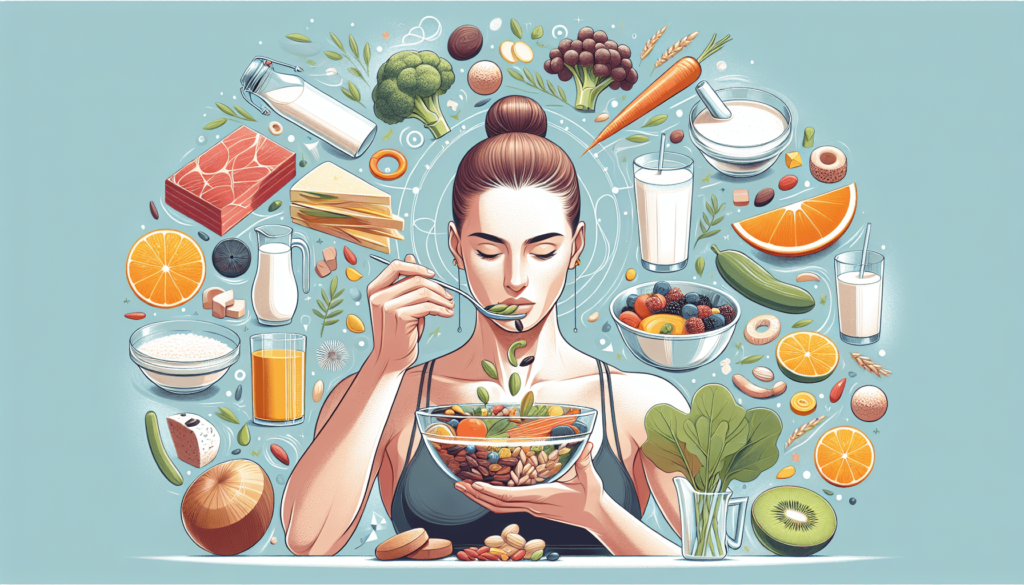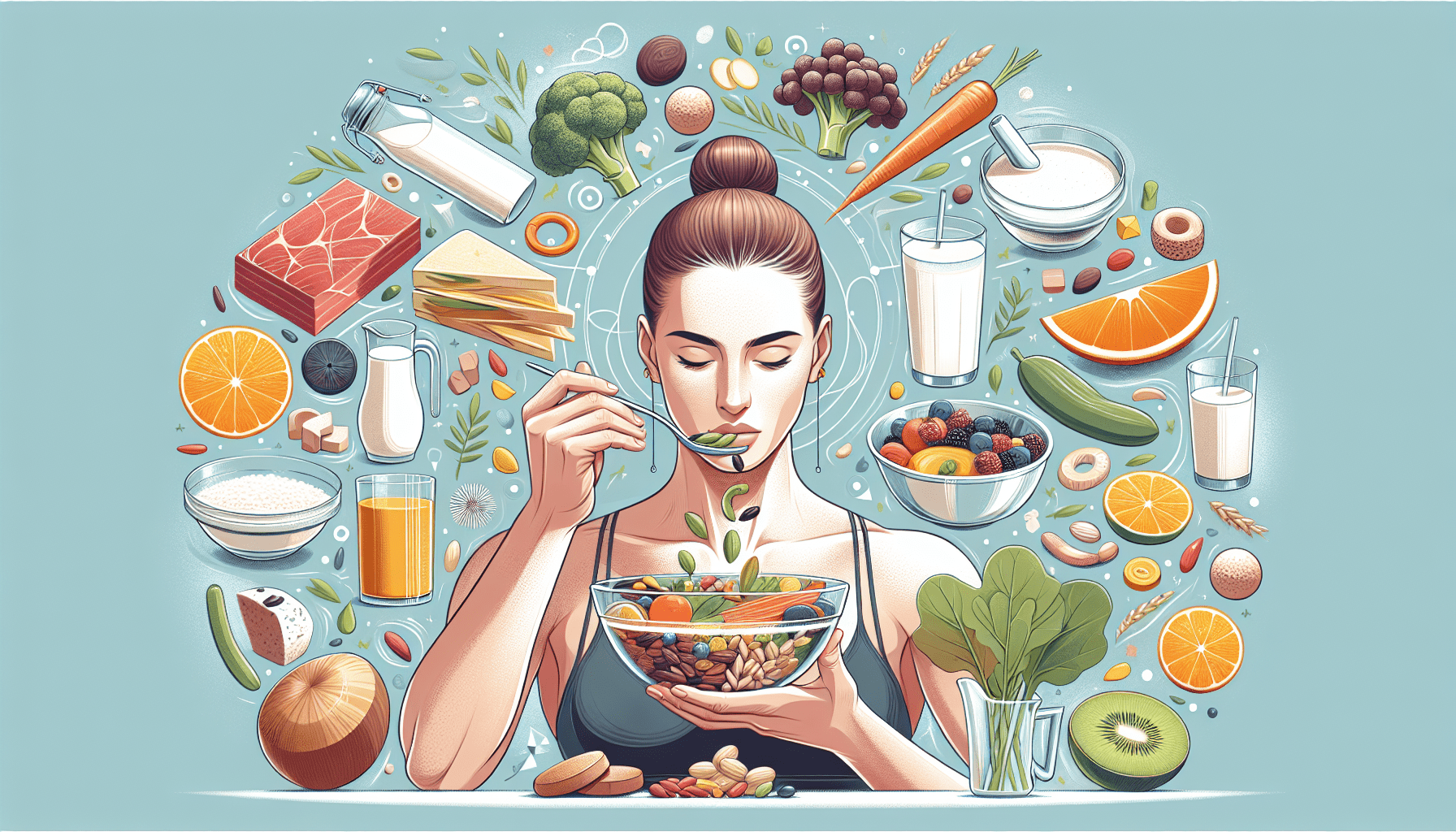Are you an athlete looking to enhance your performance and optimize your overall health and well-being? Look no further! In this article, we will explore the fascinating realm of holistic nutrition and how it can benefit athletes of all levels. By focusing on the interconnectedness of mind, body, and spirit, holistic nutrition takes a comprehensive approach to nourishment, honoring the unique needs and goals of each individual. From personalized meal plans to natural supplements and mindful eating practices, discover how this holistic approach can help you unlock your full athletic potential while nurturing your body from the inside out. Get ready to revolutionize your nutrition game!
What is Holistic Nutrition?
Holistic nutrition is an approach to eating that recognizes the interconnectedness of the mind, body, and spirit. It emphasizes nourishing the whole person and focuses on the quality of food, lifestyle factors, and the body’s natural healing abilities. Holistic nutrition takes into account the unique needs of each individual and addresses not only physical health but also mental and emotional well-being.
Definition
Holistic nutrition is a branch of nutrition that looks beyond just the macro and micronutrients in food. It recognizes that the quality of food, how it is prepared, and the individual’s relationship with food all play a significant role in overall health. Holistic nutrition takes a whole-person approach and considers aspects such as stress levels, sleep patterns, and emotional well-being when designing an optimal diet.
Principles of Holistic Nutrition
The principles of holistic nutrition revolve around nourishing the body, mind, and spirit. It emphasizes the consumption of whole, unprocessed foods that are as close to their natural state as possible. The focus is on nutrient-dense foods that provide the body with the essential vitamins, minerals, and phytonutrients it needs to function optimally. Additionally, holistic nutrition encourages mindful eating, proper hydration, regular physical activity, and stress management techniques to support overall health and wellness.
Importance of Holistic Nutrition for Athletes
Enhanced Performance
Holistic nutrition plays a crucial role in enhancing the performance of athletes. By focusing on nutrient-dense foods, athletes can fuel their bodies with the necessary energy and macronutrients to excel in their chosen sport. A well-balanced diet that includes a variety of fruits, vegetables, lean proteins, healthy fats, and whole grains provides the body with the optimal fuel it needs to perform at its best.
Faster Recovery
Holistic nutrition also plays a significant role in promoting faster recovery after intense physical activity. Adequate intake of nutrients, such as protein, carbohydrates, and antioxidants, can help repair and rebuild muscles, replenish glycogen stores, and reduce inflammation. This allows athletes to bounce back quicker from intense workouts or competitions, reducing the risk of overtraining and injury.
Reduced Risk of Injuries
By adopting a holistic nutrition approach, athletes can reduce their risk of injuries. A diet rich in anti-inflammatory foods, such as fruits, vegetables, and omega-3 fatty acids, can help mitigate inflammation and promote joint and muscle health. Additionally, proper hydration and electrolyte balance help maintain optimal muscle function, reducing the risk of cramps, strains, and other exercise-related injuries.

Key Nutrients for Athletes
Protein
Protein is a vital nutrient for athletes as it plays a crucial role in muscle repair, growth, and recovery. It is essential to consume an adequate amount of high-quality protein sources, such as lean meats, poultry, fish, beans, legumes, and dairy products. The recommended protein intake for athletes varies based on individual needs, training intensity, and goals.
Carbohydrates
Carbohydrates are the body’s primary source of energy, making them crucial for athletes’ performance. Complex carbohydrates, such as whole grains, fruits, and vegetables, provide a steady release of energy and should make up a significant portion of an athlete’s diet. It is important to balance carbohydrate intake with the individual’s activity level and training goals to optimize energy availability and glycogen stores.
Fats
Healthy fats are essential for athletes as they provide energy, support hormonal balance, and aid in nutrient absorption. Incorporating sources of unsaturated fats, such as avocados, nuts, seeds, and olive oil, can help athletes meet their caloric needs and maintain overall health. However, it is important to moderate intake and choose healthier fat sources rather than saturated and trans fats.
Vitamins and Minerals
Vitamins and minerals are vital for supporting various bodily functions, especially for athletes with high physical demands. Nutrient-rich foods, such as colorful fruits and vegetables, whole grains, lean proteins, and dairy products, provide a wide range of essential vitamins and minerals. However, athletes may need to pay extra attention to their intake of certain nutrients, such as iron, calcium, and vitamin D, to prevent deficiencies and optimize performance.
Antioxidants
Antioxidants are compounds that help protect the body from oxidative stress and inflammation caused by intense exercise. Athletes can benefit from including antioxidant-rich foods, such as berries, dark leafy greens, nuts, and seeds, in their diet. These foods provide a wide range of phytonutrients and antioxidants that support recovery, reduce muscle damage, and boost overall health.
Pre-Workout Nutrition
Macronutrient Ratio
Pre-workout nutrition plays a vital role in providing the energy and nutrients necessary for optimal performance. A balanced pre-workout meal should include a combination of carbohydrates, protein, and a moderate amount of healthy fats. The macronutrient ratio may vary depending on the individual’s preferences, training goals, and the timing of the meal.
Hydration
Proper hydration is essential before a workout to maintain fluid balance and support optimal performance. Athletes should aim to drink enough water to ensure they are adequately hydrated. The exact amount of water needed can vary based on factors such as sweat rate, climate, and intensity of the workout.
Eating Timing
Timing is crucial when it comes to pre-workout nutrition. It is recommended to consume a pre-workout meal or snack 1-3 hours before exercise to allow for proper digestion and utilization of nutrients. This timing allows the body to have a readily available source of energy during the workout without feeling too full or experiencing digestive discomfort.

Post-Workout Nutrition
Protein for Muscle Repair
After a workout, protein consumption becomes especially important for muscle repair and recovery. Consuming a combination of high-quality protein sources, such as lean meats, poultry, fish, eggs, or plant-based protein sources like beans and legumes, within 30-60 minutes of exercise is ideal to maximize muscle protein synthesis and aid in recovery.
Carbohydrates for Glycogen Replenishment
Replenishing glycogen stores is essential after intense workouts or prolonged exercise. Consuming carbohydrates post-workout helps replenish glycogen levels and provides a readily available source of energy for the body. Opt for complex carbohydrates like whole grains, fruits, and starchy vegetables to support glycogen replenishment.
Anti-Inflammatory Foods
Incorporating anti-inflammatory foods into post-workout nutrition can help reduce muscle damage and inflammation. Foods rich in omega-3 fatty acids, such as fatty fish (salmon, sardines), walnuts, and flaxseeds, as well as brightly colored fruits and vegetables, provide antioxidants and anti-inflammatory compounds that aid in recovery and promote overall health.
Hydration for Athletes
Importance of Hydration
Proper hydration is crucial for athletes as even mild dehydration can negatively impact performance and overall well-being. Hydration plays a vital role in regulating body temperature, transporting nutrients, and removing waste products. Athletes should prioritize fluid intake before, during, and after exercise to maintain optimal hydration levels.
Hydration Strategies
Athletes can employ various hydration strategies to stay properly hydrated throughout the day. These include drinking water at regular intervals, consuming hydrating foods and beverages such as fruits, vegetables, and sports drinks, and monitoring urine color as an indicator of hydration status. It is important to note that individual hydration needs may vary based on factors such as training intensity, climate, and sweat rate.
Electrolyte Balance
Electrolytes are minerals that help maintain fluid balance, nerve function, and muscle contractions. Sweating during exercise can lead to electrolyte loss, so it is important for athletes to replenish these essential minerals. Consuming electrolyte-rich foods and beverages, such as coconut water, sports drinks, and electrolyte tablets, can help restore electrolyte balance and support optimal performance.
Supplements for Athletes
Protein Powders
Protein powders can be a convenient way for athletes to meet their protein needs, especially for those with higher requirements. They provide a quick and easy source of protein that can be consumed before or after workouts. Whey protein, casein protein, and plant-based protein powders are popular choices among athletes.
Creatine
Creatine is a compound found naturally in the body and is involved in energy production during high-intensity exercise. It is a popular supplement among athletes, particularly those involved in strength and power-based sports. Creatine supplementation may enhance muscle strength, power, and performance, but individual responses may vary.
Branched-Chain Amino Acids (BCAAs)
BCAAs are a group of essential amino acids, including leucine, isoleucine, and valine. They play a crucial role in muscle protein synthesis and are often used by athletes to support muscle recovery and reduce muscle soreness. BCAA supplements are commonly available in powder or capsule form.
Omega-3 Fatty Acids
Omega-3 fatty acids, particularly the types found in fatty fish like salmon and sardines, are known for their anti-inflammatory properties and numerous health benefits. Athletes may consider omega-3 supplements to support recovery, reduce inflammation, and promote overall health. It is important to choose high-quality fish oil or algae-based supplements.
Meal Planning for Athletes
Balanced Meals
Creating balanced meals is essential for athletes to ensure they are meeting their nutrient needs and fueling their bodies effectively. Each meal should ideally contain a combination of protein, carbohydrates, healthy fats, and a variety of fruits and vegetables. This balance helps provide the necessary energy, macronutrients, and micronutrients for optimal performance and recovery.
Prepping and Cooking Tips
Meal prepping and cooking in advance can be beneficial for athletes who lead busy lifestyles or have limited time for food preparation. Preparing large batches of proteins, grains, and vegetables ahead of time can help streamline meal preparation throughout the week. Investing in storage containers and portioning out meals in advance can also make healthy eating more convenient.
Snack Options
Snacks play an important role in providing energy and supporting nutritional needs between meals, especially for athletes with high caloric requirements. Opt for nutrient-dense options such as Greek yogurt, nuts, seeds, fruits, vegetables, and homemade energy bars. These snacks can be easily packed and consumed on the go, ensuring athletes have access to fuel throughout the day.
Mindful Eating for Athletes
Benefits of Mindful Eating
Practicing mindful eating can have numerous benefits for athletes, including increased enjoyment of food, improved digestion, and better overall awareness of hunger and fullness cues. By slowing down and savoring each bite, athletes can develop a healthier relationship with food and make choices that support their physical and emotional well-being.
Techniques to Practice Mindful Eating
There are several techniques athletes can use to practice mindful eating. These include chewing food slowly and thoroughly, paying attention to taste and texture, and eating without distractions such as television or electronic devices. Taking time to appreciate the colors and aromas of food, practicing gratitude, and listening to hunger and fullness cues are also effective strategies for promoting mindful eating.
Seeking Professional Guidance
Registered Dietitians
Registered dietitians (RDs) are trained professionals who specialize in providing evidence-based nutrition advice. They can design personalized meal plans and provide guidance on meeting individual nutritional needs. RDs can support athletes in optimizing their performance, promoting recovery, and addressing any specific dietary concerns or restrictions.
Sports Nutritionists
Sports nutritionists specialize in the unique nutritional needs of athletes and provide guidance on optimal fueling strategies for training, competition, and recovery. They can create tailored nutrition plans to support performance goals, improve body composition, and address specific dietary requirements. Sports nutritionists often work closely with athletes to fine-tune their diets and provide ongoing support and advice.
Holistic Health Coaches
Holistic health coaches take a comprehensive approach to health and wellness, focusing on nutrition, lifestyle factors, and overall well-being. They can provide guidance on adopting a holistic nutrition approach and support athletes in making positive changes to their diet and lifestyle. Holistic health coaches often work with individuals to set goals, develop action plans, and provide ongoing support and accountability.
In conclusion, holistic nutrition is a comprehensive approach to nourishing the body, mind, and spirit. For athletes, holistic nutrition plays a vital role in enhancing performance, supporting recovery, and reducing the risk of injuries. By focusing on key nutrients, proper pre and post-workout nutrition, hydration, and mindful eating, athletes can optimize their nutritional intake to fuel their bodies effectively. Additionally, seeking guidance from registered dietitians, sports nutritionists, or holistic health coaches can provide personalized support to meet individual needs and goals. With a holistic nutrition approach, athletes can thrive, both on and off the field.

